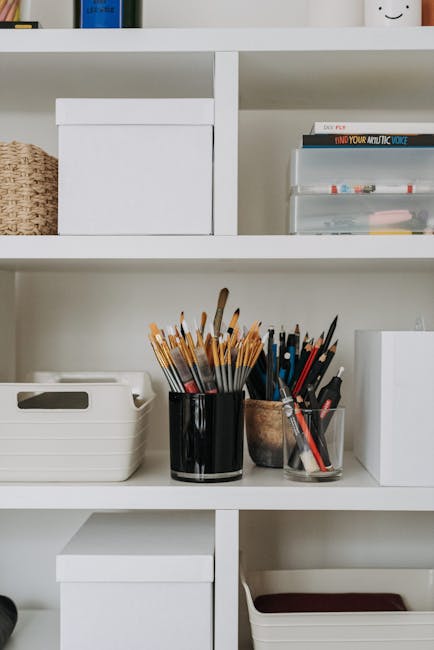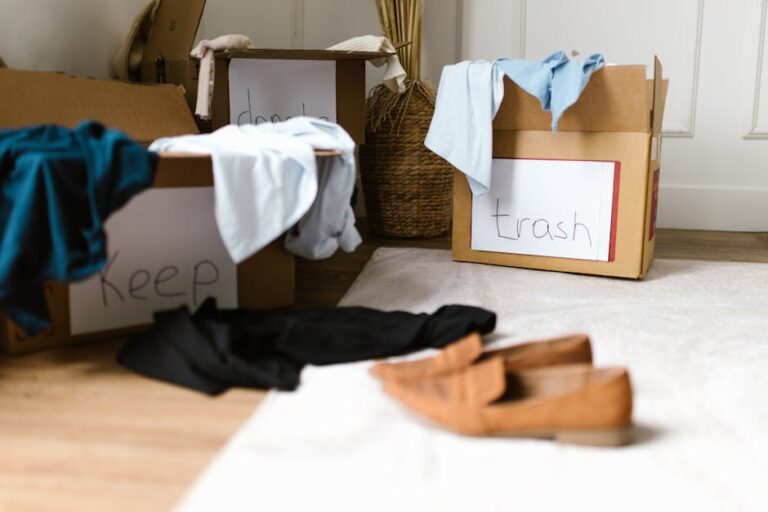
Decluttering as the Foundation of an Efficient Home
Decluttering is paramount. It’s the bedrock upon which any truly efficient home is built. Before even contemplating storage solutions or organizational gadgets, one must ruthlessly assess possessions. The “KonMari Method,” championed by Marie Kondo, encourages evaluating each item based on whether it “sparks joy.” While this resonates with some, a more pragmatic approach might be necessary for others. Ask yourself: have I used this in the past year? Is it likely I will use it in the next year? Does it hold significant sentimental value that outweighs its spatial footprint? Be honest. Sentimentality can be a powerful hoarding enabler.
Categorize items into distinct piles: Keep, Donate, Sell, Trash. The “Donate” pile should be further segmented; items appropriate for homeless shelters differ from those suited for a thrift store specializing in vintage goods. Selling can recoup some value, but realistically assess the time commitment versus potential return. Free online platforms like Facebook Marketplace and Craigslist can be useful, but require vigilance regarding communication and safety. Trash should be a last resort, but broken or unusable items contribute only to visual and mental clutter.
Once the decluttering is complete, resist the urge to immediately refill the emptied space. Live with the newfound emptiness for a week or two. This allows you to better understand your space needs and prevents impulsive purchases of items you don’t actually require.
Strategic Storage Solutions: Maximizing Every Inch
Effective storage isn’t simply about containing belongings; it’s about accessibility and ease of maintenance. Vertical space is often underutilized. Tall shelves, reaching towards the ceiling, can house lesser-used items, freeing up prime real estate at eye level. Install shelves in awkward spaces like above doorways or in corners. Consider floating shelves, which provide a minimalist look and maximize floor space.
Under-bed storage is invaluable, especially in smaller homes. Opt for plastic bins with secure lids to protect items from dust and moisture. Clearly label each bin to avoid rummaging. Similarly, utilize the space under furniture like sofas and chairs. Ottomans with hidden storage are a clever dual-purpose solution.
Kitchens often suffer from a lack of efficient storage. Invest in cabinet organizers such as pull-out shelves, drawer dividers, and spice racks. Utilize the inside of cabinet doors for hanging pot lids or small utensils. Magnetic knife strips free up counter space and are a safer alternative to bulky knife blocks.
Garages can quickly become dumping grounds. Install shelving units along the walls to keep items off the floor. Hang bicycles from the ceiling or walls to maximize space. Utilize clear storage bins to easily identify the contents without having to open them.
Optimizing Workflow and Daily Routines
An efficient home fosters streamlined routines. Analyze your daily habits and identify bottlenecks or areas of friction. For example, if mornings are chaotic, create a designated “launch zone” near the entryway. This zone should include hooks for coats, a basket for shoes, a shelf for keys, and a charging station for electronic devices. Prepare as much as possible the night before, such as laying out clothes and packing lunches.
In the kitchen, adopt the principle of “mise en place” – having all ingredients prepped and measured before beginning to cook. This minimizes frantic searching during meal preparation. Store frequently used items within easy reach, and organize the pantry based on usage frequency. Consider dedicating a specific drawer or shelf to meal-prepping containers.
Bathrooms can quickly become cluttered. Store toiletries in a medicine cabinet or under-sink organizer. Install a towel rack near the shower to avoid dripping water across the floor. Designate a specific hamper for dirty laundry and empty it regularly. Consider using a shower caddy to keep shampoo, conditioner, and body wash organized.
Embracing Minimalism: Conscious Consumption and a Decluttered Mind
Minimalism isn’t about deprivation; it’s about intentionality. It’s about curating a life filled with only the things you truly need and value. This reduces clutter, simplifies cleaning, and frees up mental energy. Before making a purchase, ask yourself: is this a need or a want? Will it add value to my life? Do I already own something similar?
Adopt a “one in, one out” policy. Whenever you purchase a new item, get rid of a similar item you already own. This prevents accumulation and keeps clutter at bay. Regularly review your belongings and identify items you no longer use or need.
Be mindful of the information you consume. Unsubscribe from unnecessary emails and social media accounts that contribute to visual clutter. Read physical books or listen to podcasts instead of passively scrolling through social media.
Minimalism extends beyond physical possessions. It’s about simplifying your schedule and commitments. Learn to say “no” to activities that don’t align with your priorities. Delegate tasks whenever possible to free up your time and energy.
Technology Integration: Smart Solutions for Enhanced Efficiency
Technology can significantly enhance home efficiency. Smart thermostats can automatically adjust the temperature based on your schedule, saving energy and money. Smart lighting systems allow you to control lights remotely, creating the illusion that someone is home even when you’re away.
Voice-activated assistants like Amazon Alexa or Google Assistant can automate tasks such as playing music, setting timers, and controlling smart home devices. Smart plugs can turn any appliance into a smart appliance, allowing you to control it remotely.
Robot vacuum cleaners can automatically clean your floors, freeing up your time for other tasks. Smart irrigation systems can water your lawn based on the weather forecast, saving water and money.
Paperless solutions can reduce clutter and improve organization. Scan important documents and store them digitally. Use online bill pay to avoid receiving paper bills. Utilize calendar apps and to-do list apps to stay organized and manage your schedule.
The Importance of Regular Maintenance and Cleaning
Even the most efficiently organized home requires regular maintenance and cleaning. Set aside dedicated time each week for cleaning tasks. Break down large cleaning projects into smaller, more manageable tasks.
Develop a cleaning schedule and stick to it. Rotate tasks each week to prevent burnout. Involve other members of the household in the cleaning process.
Implement a “clean as you go” policy. Wipe up spills immediately and put items back in their designated places after using them. This prevents clutter from accumulating and makes cleaning easier.
Regularly inspect your home for maintenance issues, such as leaky faucets or clogged drains. Address these issues promptly to prevent them from escalating into larger, more costly problems.
Deep clean your home seasonally. This includes tasks such as cleaning carpets, washing windows, and decluttering closets.
Sustainability Considerations: Reducing Waste and Environmental Impact
An efficient home is also a sustainable home. Reduce your environmental impact by adopting eco-friendly practices.
Conserve water by fixing leaky faucets and installing low-flow showerheads and toilets. Collect rainwater for watering plants.
Conserve energy by using energy-efficient appliances and light bulbs. Unplug electronic devices when they’re not in use.
Reduce waste by recycling and composting. Avoid single-use plastics and choose reusable alternatives.
Buy products with minimal packaging. Support companies that are committed to sustainability.
Consider incorporating solar panels or other renewable energy sources into your home.
By adopting these principles and practices, you can transform your home into an efficient and enjoyable space that supports your well-being and simplifies your life. The journey to an efficient home is an ongoing process, requiring commitment and adaptation. However, the rewards – a decluttered mind, a streamlined routine, and a greater sense of control – are well worth the effort.

